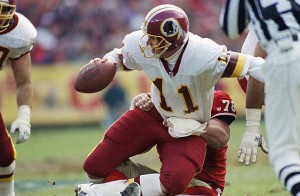Mark Rypien Lead Plaintiff in Lawsuit against NFL
Daily News Article — Posted on April 9, 2012
(by Nathan Fenno, WashingtonTimes.com) – Former Washington Redskins quarterback Mark Rypien has sued the NFL over “repeated traumatic injuries to his head” sustained during his 11-season career.
Mr. Rypien is the lead plaintiff in a mass-tort lawsuit filed Friday, March 23rd, in U.S. District Court for the Eastern District of Pennsylvania. Taking part in the lawsuit are 126 former players [as of March 27th], including 14 other ex-Redskins, as well as Tony Mandarich and Todd Marinovich.
The lawsuit alleges that the NFL was aware of the risks of repetitive traumatic brain injury but hid the information and misled players, resulting in permanent brain damage or neurological disorders.
“It’s scary the extent to which these guys have been hurt,” said Gene Locks, the plaintiffs’ lead attorney. “When we played football, broken bones, busted noses, tears of tissue were kind of expected. Nobody said you’d get a head injury. These injuries are insidious, they are latent, degenerative, and it gets worse and worse as you get older in certain players.”
According to the lawsuit, Mr. Rypien “suffers from various neurological conditions and symptoms related to the multiple head traumas.”
The same language is used for each of the 125 other plaintiffs. The other ex-Redskins included in the lawsuit are: Michael Batiste, Keith Biggers, Jason Doering, Brad Fichtel, Scott Galbraith, Terry Hoage, Ethan Horton, Ernie Janet, Bruce Kimball, Ron Middleton, John Pergine, Ed Simmons, Walter Stanley and James Steffen.
Some have speculated NFL commissioner Roger Goodell’s harsh penalties against the New Orleans Saints for their bounty program was, in part, a reaction to the flurry of concussion lawsuits. Concussions have also dogged the National Hockey League, which has experienced a sharp increase in reported head injuries the past two seasons.
“I think it took them too long,” Mr. Locks said of Mr. Goodell’s response. “They really should’ve done things a long time ago. They didn’t.”
Asked for comment on the latest lawsuit, the NFL on Tuesday [March 27] released a statement through a league spokesman: “The NFL has long made player safety a priority and continues to do so. Any allegation that the NFL intentionally sought to mislead players has no merit. It stands in contrast to the league’s actions to better protect players and advance the science and medical understanding of the management and treatment of concussions.”
Mr. Rypien led the Redskins to a 37-24 win over the Buffalo Bills in Super Bowl XXVI and was named the game’s Most Valuable Player, the highlight of his six seasons with the team. He also played for the Cleveland Browns, Indianapolis Colts, Philadelphia Eagles and St. Louis Rams.
Mr. Rypien, 49, resides in Spokane, Wash., and oversees the Rypien Foundation he established in 2004 to assist families battling childhood cancer. Messages seeking comment from Mr. Rypien through his foundation weren’t immediately returned Tuesday.
This the latest in a string of lawsuits targeting the NFL over head injuries. One site tracking the legal maneuvers, NFLConcussionLitigation.com, estimates that 51 lawsuits have been filed against the NFL. That includes five wrongful death lawsuits.
Mr. Locks estimates that his Locks Law Firm represents 500 to 600 ex-players who have filed suit against the NFL over head injuries.
Mr. Rypien’s lawsuit covers eight counts including, like many of the other lawsuits, conspiracy to defraud, fraud and negligence.
In 1995, Mr. Rypien told USA Today that he sustained two concussions in his career. “I thought that was two too many,” he said.
• Rich Campbell contributed to this report.
Copyright 2012 The Washington Times, LLC. Reprinted from The Washington Times for educational purposes only. Visit the website at washingtontimes.com.
Questions
1. Define the following words as used in the article:
- plaintiff (para. 2)
- tort (para. 2)
- alleges (para. 2)
- insidious (para. 2)
- latent (para. 2)
- degenerative (para. 2)
- negligence (para. 2)
2. a) How many former NFL players are taking part in a mass-tort lawsuit filed at the end of March in Pennsylvania?
b) Who is the lead plaintiff?
3. a) What problems do each of the plaintiffs suffer from, according to the lawsuit?
b) What accusations are made against the NFL in many of the players' lawsuits?
4. How has the NFL responded to these accusations?
5. a) Do you think the former players have a legitimate case? Explain your answer.
b) Do you think concussions and other head injuries could be prevented in pro-football? Should the game be changed to avoid this in the future, or should players be given lengthy, detailed explanations of the health risks of playing pro-football? Explain your answers.

